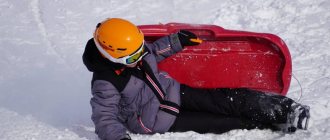Conversation for students
"Rules of conduct in schools"
Dear Guys!
Today, the reason for our meeting was the fact that in schools, cases of injuries and injuries as a result of accidents and conflict situations with classmates or school students have become more frequent.
School is a place where large numbers of people gather. And imagine if everyone here begins to behave as they please. What then will the school become? To prevent this from happening, and also to protect yourself and your friends from various injuries, every student and his parents need to know all the rules of behavior at school.
Of course, there are many of them, and they are all spelled out in the charters of your schools, but I would like to draw your attention to a few rules:
No need to run through corridors, classrooms and stairs, it's not safe! Such fast games will sooner or later lead to bruises or injuries. Having fun in this way, you can easily injure yourself and the comrades around you. Often you don’t think about what serious consequences ordinary children’s games can lead to. You can push someone slightly, and your friend will accidentally hit his head against the wall as a result of this push, or, even worse, may fall on some sharp object; you can jokingly throw a pen or notebook at your deskmate, and this pen or corner of the notebook will hit your classmate in the eye. Therefore, first of all, before you do anything, you need to think carefully about what your actions may lead to. So that after this your friends do not end up in hospitals for treatment, and you do not have to be punished for your action. After all, you should all know that for committing crimes such as causing harm to the health of another person, theft, etc., punishment in our country is provided from the age of 16, but there are also crimes such as murder, causing grievous harm to health, for which liability comes from the age of 14. And remember, please, that you can even kill a person simply by pushing him unsuccessfully!
Try to resolve all conflicts that may arise between you and your comrades peacefully; there is no need to start fights over this, insult each other, etc. Be more careful about your health and the health of your classmates.
All schools have so-called high-risk classrooms, these are physics and chemistry classrooms with various instruments and reagents, gyms where sports equipment is located. Be especially attentive and careful towards each other in such places: do not run, jump or make noise.
You should not bring piercing or cutting objects or gas canisters to school, as this could injure you and others around you.
And in conclusion, I would like to remind you once again that the most precious thing we all have is our health and that of our loved ones. Therefore, let's all follow the rules of conduct in schools, public places, at home and be more attentive to each other!!
Rules of behavior at home and on the street
- if you find yourself at home without your parents, do not open the door to anyone stranger or stranger, no matter how the stranger introduces himself;
- don’t get confused if, while in the apartment, you hear someone trying to open the front door, but ask loudly “Who’s there?”;
- if strangers continue to open the door, it would be correct to call the police by phone “02”, indicate the exact address and then from the balcony or window call neighbors or others for help;
— to phone calls asking if parents are there and when they will return from work, you must answer that they are busy and ask who and when to call back;
- when leaving home, do not forget to close the balcony, vents and windows, especially if you live on the first or last floors;
- do not leave notes at the door of your apartment, as this attracts the attention of strangers;
- be careful with your apartment keys - don’t lose them, don’t leave them under the rug, in the mailbox or in other (only for you!) secluded places. If keys are lost or missing, it is important to immediately notify parents and replace the door locks;
- do not brag to others about what expensive items you have in your apartment (television, video - radio equipment, clothes, jewelry, etc.), as well as the amount of money;
- under no circumstances should you invite unfamiliar or unfamiliar boys and girls into your house;
— boys and girls do the right thing when they introduce their parents to their friends and comrades;
- do not carry large sums of money with you, and if by chance such money ends up in your pocket, do not brag about it;
- if boys demand money in the yard or near the school, try to convince them that there is no money, and if possible, report it to the police;
— to questions from strangers “are your parents at home?” (father or mother), it is better to answer that the parents are resting at home;
- you don’t need to talk to drunk people on the street, even with people you know, because a drunk person changes a lot, his actions can be unpredictable and cruel;
- do not get into a car with strangers or unfamiliar people, even if you really want to go for a ride or you are late;
- if people unknown to you invite you to listen to music, act in a movie, watch a video, play or show a dog, another animal (there may be another pretext) - do not rush to agree, first be sure to consult with your parents or any other adult whom you know well and trust;
- if you feel that you are being followed, go to the nearest store, another place and ask an adult passerby to accompany you home;
- in any alarming case, you must contact the police, where you will always receive advice and help.
Memo for conducting a lecture with students
Guys!
The topic of our conversation is very important. Today we will talk about responsibility for committing illegal acts, learn the algorithm for safe behavior “How to avoid becoming a victim of crime and violence.”
First of all, I would like to remind you that you are students of an educational institution and are obliged to comply with the rules of conduct and fulfill the requirements made of you by teachers.
The legislation of the Russian Federation provides for administrative liability for committing an administrative offense (from 16 years of age), for committing a crime (from 14 and 16 years of age - depending on the severity of the crime).
Since the beginning of the new school year, the number of conflict situations and accidents has sharply increased in educational institutions of the region. Often, conflicts between students end in fights, causing bodily harm, including those with serious consequences.
First of all, you need to know that committing such illegal actions also has legal consequences.
Each fact is investigated; if guilt is established, the minor is brought to both administrative and criminal liability, and the issue of registration with juvenile affairs units is decided.
It is important to remember and know that you must have rules of safe behavior.
While away from school and at home, you may become a victim of an accident or crime.
In order to avoid becoming a victim of crime or violence, you must follow the rules and know how to act in a particular emergency situation (this is set out in leaflets prepared specifically for you).
Before committing an illegal act, think carefully about its consequences!
Don’t forget that your parents are waiting for you at home, so follow the rules of safe behavior and don’t put yourself in danger!
In order to warn you against committing rash acts and committing criminal attacks against you, the Russian Ministry of Internal Affairs for the Omsk Region invites you to read these leaflets.
Conversation with boys in grades 5-9
sex education for students
CONVERSATION
with boys in grades 5-9
On the topic: “ Changes during puberty ”
educational psychologist
Ust-Nerskaya basic secondary school
schools with special classes
Pascal Victoria Viktorovna
Ust-Nera village, 2013
During puberty, hair begins to grow in places where it never existed before. You grow pubic hair, armpit hair, and facial hair. Darker hair may also begin to grow on the arms and legs, and it may appear on the chest and other parts of the body.
Armpit hair can begin to grow at any stage of puberty. For most boys, pubic hair growth precedes armpit hair growth. On average, hair there begins to grow a year or two after the first pubic hair appears.
Hair may also appear on the chest. Some boys also have hair on their shoulders, back, buttocks, and some even grow on the back of their hands. Some boys get really hairy, others have very little hair.
If the men in your family are hairy, then most likely you will be too. If they have thin hair, then you will have the same. Again, this is not a hard and fast rule.
Body hair (or lack thereof) has nothing to do with how masculine you are. Some people (both men and women) find hairiness attractive, while others prefer a smoother body. But most people just don't pay that much attention. If you're worried about the amount of hair on your body, try not to think about it. In any case, worrying will not help solve the problem at all. Besides, does anyone decide whether to like him or not based on the amount of hair on his body?
As a boy goes through puberty, he develops facial hair: a mustache, short sideburns, and a beard begin to appear. The average boy develops facial hair between the ages of 14 and 16. Some boys notice the appearance of hair a little earlier. For some, they may grow after 19 or 20 years of age.
Typically, the first facial hair to appear is on the outer corners of the upper lip. At first there are few of them, and they are not very dark in color. As you grow older, they darken and become more numerous. The mustache will gradually grow from the corners to the middle of the upper lip. At the same time, hair will appear on the top of your cheeks. At the same time, your sideburns and hair in the hollow under your lower lip may begin to grow.
Gradually, facial hair will become thicker and darker. The beard and mustache can be the same color as the hair on your head, or they can be a different color. By age 18, you may find that your beard and mustache have reached their maximum thickness. However, many men continue to grow facial hair well into their 20s. A man may have sparse facial hair in his teens, but by age 30 his beard may become thick and his sideburns and mustache bushy.
Some adult men shave daily. Those who grow a beard quickly and have a thick mustache even shave twice a day. Others grow mustaches, sideburns or beards. This is a personal matter for everyone, their individual taste.
Shaving does not make hair thicker or darker when it grows back. It just seems that way.
The thickness of the hair is uneven: its shaft is thinner at the tip than in the middle or at the base. When shaving, the hair is cut off at its thickest part.
If you've never shaved, the most visible part of the hair above the surface of the skin is the thin, tapered part of the shaft. As soon as you started shaving, those ends were gone. What you see is the thickest part of each hair shaft.
Your hair hasn't actually gotten thicker. Although it seems that this is so.
You have a choice between razors and electric shavers. Some men prefer the convenience of electric shavers. Cordless electric shavers are especially popular. There are 2 types of electric shavers: with an oscillatory (mesh) and a rotational system.
Electric shavers do not require shaving cream. You don't need to change the blade. They are convenient to take with you.
Less risk of getting hurt. But good electric shavers aren't cheap. And they don't guarantee you the same close shave as using a blade razor.
Most men prefer blade razors. The two most popular types are the disposable razor and the refill razor. You will throw away the first one as soon as it becomes dull. You will use the other one many times, changing cassettes. Most men use reusable machines with replaceable cassettes.
You also have the choice between single, double and triple blade razors. You'll likely enjoy the closer shave achieved by using a double or triple blade. Many razors have floating heads or under
Double or triple blades are associated with a greater risk of ingrown hairs. If you have a tendency to get ingrown hairs, then an electric razor is your best bet. You can seek advice from your father or another man you trust.
Change your blades at least every 4-5 shaves. A dull blade can stretch your skin. This will cause a painful irritation called "razor rash." If you drop the razor, subtle cracks may appear on the blade. If you drop the blade, you can throw it away, first wet your hair. Give your hair a minute or two to soak in the water. Warm water does not make hair thicker or softer, making shaving easier due to reduced resistance. Many men shave immediately after showering.
Hot water and steam help soften hair. Shave the areas on the chin and above the upper lip last to allow the water to be properly absorbed and soften the hair;
• use shaving cream or gel, but not soap. Creams and gels reduce the pulling of the skin by the blade when shaving. They also soften stubble. Soap dulls the blade and makes hair coarser, making shaving more difficult; “Drive the razor lightly and rinse it frequently. Do not press the blade into your skin. Use light touches. Avoid shaving the same area repeatedly. Rinse your razor frequently to prevent hair from accumulating between the blades; shave in the right direction. The closest shave is achieved when you shave against the grain of the hair. However, shaving along the hairline is less damaging to the skin. You can shave your cheeks in the direction of hair growth, down. But many men shave their chin upwards, against the direction of hair growth. Never shave against the grain if your skin is prone to ingrown hairs; Rinse your face with cool water and wipe dry. Rinsing with cold water helps tighten pores and soften the skin. When drying, stroke the skin rather than rub. You can use aftershave lotion. Be careful with lotions containing alcohol. They may cause skin irritation; Never lend your razor or borrow someone else's. Don't share. You may be at risk of infection; Treat skin irritations immediately. If you experience skin irritation, use some alcohol-containing solution.
Shaving Tips: Electric Razors
Here are some tips to help you get the best shave with electric shavers: Keep your face dry before shaving; make light movements. Do not press the blade into the skin. Pressing too hard does not provide a smoother shave. Make circular movements when using a razor with a rotary system and vertical movements when using a razor with an oscillating (foil) system;
• clean the heads. Follow the manufacturer's instructions. If you use a rotary razor, you will likely need to clean them every month or two. When using a razor with an oscillating (foil) system, remove the shaving unit and shake out the hairs after each shave.
Sweating and body odor
If you ran up and down the stairs ten times in a row, or it's just a hot summer day, what will happen?
Of course you will sweat. When the temperature rises sharply or you experience heavy exertion, your sweat glands begin to work actively. They produce sweat. Stress, fear and other strong emotions can also stimulate your sweat glands.
There are millions of sweat glands in our body. They permeate our entire skin. They protect us from overheating by secreting sweat. Sweat is 99% water with a small percentage of salt mixed with other substances. Water evaporates quickly, lowering our body temperature. And the salt contained in sweat helps to release more water from the body.
During puberty, the work of the sweat glands intensifies, and special sweat glands under the armpits and in the genital area become active for the first time. This means you sweat more and in more places. You may notice more sweating on your forehead, upper lip, neck and chest when you do any exercise. On the other hand, fear or excitement usually causes sweating in the armpits, palms and soles of the feet. Even if you are a fearless and carefree person, you will still sweat heavily in these areas because there are more sweat glands there than in other parts of the body.
Body odor also changes during puberty. Sweat as such has virtually no odor. The unpleasant odor is caused by bacteria that live on the surface of human skin and dissolve in sweat. These bacteria are very fond of the mentioned special sweat glands under the armpits and in the genital area, where they are activated during puberty.
Much of what we call body odor comes from the armpits, where the moist, warm environment is conducive to bacterial growth. Sweat can smell truly disgusting when bacteria have had enough time to do their job.
How to deal with sweating and bad odor
Puberty-related changes in body odor and sweating are a natural and healthy process. It's part of growing up. Still, some young people worry about this. And this is not surprising. Companies spend a lot of money on TV and magazine advertisements that make us worry about body odor and “dryness.” Don't let them deprive you of your peace of mind and make you endlessly worry about imaginary problems! Sweating is necessary, it helps not to overheat. In this way, our body also gets rid of “waste”. But it’s not at all necessary that you “reek”, even if you sweat a lot.
It's easy to smell clean and fresh.
Here are some tips:
* Take a bath or shower regularly. Washing daily will get rid of odor-causing bacteria. It is especially important to keep the armpits and genital area clean;
• use antibacterial soap. Research shows that it can control bacteria formation within 16 hours;
Odor-producing bacteria can live on your clothes, so keep them clean; wear clothes that breathe. If you sweat a lot, wear pure cotton underwear. Cotton allows more air to pass through and allow it to circulate, keeping your skin dry.
Deodorants and antiperspirants
If the smell or increased activity of the sweat glands under your arms bothers you, you can use deodorant or antiperspirant. Many deodorants envelop the body with their scent. Some also fight odor-causing bacteria. Antiperspirants reduce sweating and thus keep the skin dry. Most deodorants contain antiperspirant.
These products are available in the form of sprays, sticks (pencils), gels, creams, lotions or balls. Some are unscented, while others are made with added fragrance. There are deodorants that are advertised as men's, but by and large there is not much difference between men's and women's deodorants.
For most boys, acne
- an integral attribute of puberty. The sebaceous glands in the skin are activated and begin to work in enhanced mode. The excess oil they produce often clogs the pores. As a result, acne appears on the face. Sometimes the situation gets worse. In this case we are dealing with acne.
Sebaceous glands are located throughout the body. Most of them are on the face, neck, chest and back. This is where you can expect acne to appear.
Blackheads are not dirt accumulated in the cork, but a chemical reaction on the surface of the skin that turns the cork black.
These white and black heads are nothing more than a slight inflammation of the sebaceous gland. Boils are more serious. They occur when harmful bacteria that live on the surface of the skin infect the pore-clogging sebum. They penetrate the sebum and begin to multiply. The result is redness and swelling.
Sometimes the walls inside the infected hair follicle burst. The infection can then spread under the skin. This is the most serious type of inflammation of the sebaceous gland, which results in large, painful red bumps.
Treatment
Pimples, blackheads, boils and blackheads are not funny. They are unattractive, but what's worse is that deep acne can turn into ulcers or leave scars on the skin. However, this problem can be dealt with, including a lot that can be done at home. What works best depends on the type of inflammation and how deep it is.
Many people believe that inflammation occurs due to poor hygiene, and that if you wash your face more often, it will go away. It is not true. Washing your face twice a day is sufficient; washing more frequently will not help prevent or cure inflammation.
Sometimes hair oil can irritate sore spots on the forehead. In these cases, washing your hair more often and combing it back can help.
Adults will tell you not to pop your pimples. They are right. This can cause the infection to penetrate deeper into the skin and leave scars.
There are many anti-acne products available. Some people say, “Pimples will go away on their own,” or “You just have to wait until you grow up.” But in cases of severe inflammation, permanent scars may remain if left to chance. If you have a case more complex than just acne, then you need to visit a doctor. The recommendations below will help you decide. See your doctor if you have an inflammation of the sebaceous gland or if any of the following are true:
• you have used an over-the-counter product for two months or more without significant or no improvement in your skin condition;
• acne does not allow you to live life to the fullest; you have large, red, painful acne; Other members of your family also have deep inflammations on the face;
you were only 9 or 10 years old when you got your first pimples.
The doctor can prescribe a remedy that is best suited for your case. This product can only be sold by prescription. Always listen to your doctor's advice and report
Get text
Leisure organization
Conversations conducted by the teacher during class hours should concern the issues of attracting schoolchildren to classes in sports sections. Organization of leisure time for children at risk is especially important.
Involving students in the work of various associations, as well as artistic circles, is also the prevention of delinquency among minors at school. A conversation on these topics must be included in the classroom plan. After all, the development of students’ creative initiative, as well as the active and useful conduct of their leisure time, without any doubt, shapes the child’s law-abiding behavior.
Problem children
Teenagers prone to committing illegal offenses usually:
1. They avoid studying for reasons of poor performance in a large number of subjects, focus on other types of activities, lag behind in intellectual development, and also have no interest in the process of cognition.
2. They exhibit low social and labor activity in the form of refusal of assignments, disdain for class work, and demonstrative disregard for completing work tasks. In addition, such students disrespect public property and damage it.
3. They are characterized by such negative manifestations as the use of toxic, psychotropic drugs and alcoholic beverages. Such teenagers, as a rule, have a craving for gambling.
4. They evaluate the surrounding reality negatively.
5. They are highly critical of adults and teachers in the form of rudeness, absenteeism, theft and various unmotivated actions.
6. They are indifferent or skeptical about educational activities.
Early crime prevention is a set of measures whose purpose is the following:
— improving the living conditions of children; — identification and suppression of sources that have antisocial influence; — conducting a conversation on the prevention of delinquency among minors.
Organization of the educational process by the class teacher
To date, crime statistics are disappointing. Of all crimes, every eleventh is committed by teenagers. And this behavior is influenced by many negative both external and internal factors.
That is why conversations on the prevention of delinquency among minors are sometimes timely and qualified assistance to children, as well as their families, who find themselves in crisis social and other situations.
At the beginning of the school period, the class teacher is assigned the following tasks:
— creating conditions conducive to the social adaptation of pupils; — providing assistance in solving problems facing adolescents; - developing positive values in children in relation to school, society, people, work, themselves, as well as the laws and norms of society; — providing qualified pedagogical assistance to the student’s family in raising the child.
The implementation of all these tasks is possible with the help of observations and testing, behavior analysis and counseling, questionnaires, diagnostics and group work. One of the forms of such activity is conversations conducted by the teacher on the prevention of delinquency among minors.
For the normal development of the personality of each child and the education of the student, it is important for the class teacher to adhere to:
— a humane style of relationships between participants in the educational process; — democratic principles of communication with students; - reasonable order and discipline; - the principle of opportunity for children to demonstrate initiative, which must be supported by the teacher.
Conversations on the prevention of delinquency among minors should be carried out systematically. At the same time, their topics are coordinated with a pre-drawn up plan of events.
Conversations on the prevention of delinquency among minors at school are held within the framework of:
— preventive work; — organization of leisure activities; - working with parents; — legal education; — organizing vacations; - working with difficult children.
At the beginning of the school year, class teachers create family passports. The teacher identifies difficult children and creates a data bank of students who find themselves in difficult life situations, as well as families in which they have been identified as being in a socially dangerous state. This work is being done to help them.
Pedagogical task
Working with students at school is a multidimensional process, very complex and lengthy in its duration. At the same time, the teaching staff of educational institutions is given a rather specific task, namely, the prevention of delinquency and crime among minors. Conversation during such events is the most effective way to prevent the occurrence of situations where a person commits guilty acts. But in addition to this, the school must provide all opportunities for the normal development of children. The teacher’s task is to identify students who are prone to violations of moral and legal norms. At the same time, it is important to study the individual characteristics of such children, as well as the reasons for the moral deviation of the individual.
If such events are carried out on time, this will make it possible, on the basis of properly organized educational assistance, to prevent situations leading to misconduct or offenses.
Closing gaps in children's knowledge
The most important element of the system for preventing antisocial behavior in schoolchildren is constant monitoring of academic performance. These are very effective steps to prevent crime among minors at school. A conversation with the parents of students who have gaps in knowledge makes it possible to eliminate this problem in a timely manner. In addition to such information, the class teacher conducts individual work with his students, while involving successful students and other teachers. In addition, it is important for teachers to attend their children's classes in various subjects. This will also be the prevention of juvenile delinquency at school. Conversations with students in the future should take place as part of an analysis of their behavior and work in the classroom.






